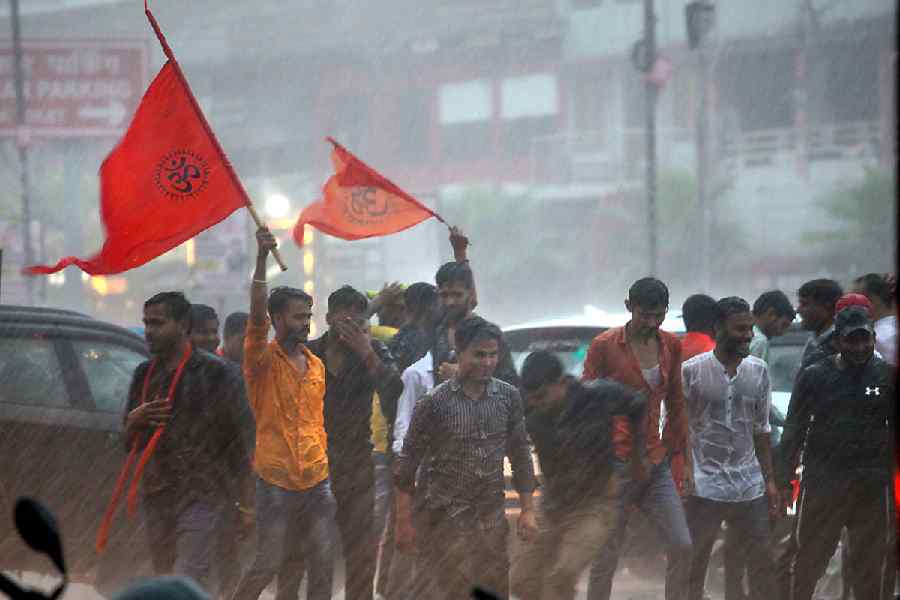Religious processions undertaken during July and August had been in the spotlight across Uttar Pradesh, Uttarakhand, and Haryana for various reasons. The governments of Uttar Pradesh and Uttarakhand ordered eateries along the kanwar yatra route to disclose the names of their owners. The orders were criticised by the Opposition and the civil society. Even the Janata Dal (United), the Rashtriya Lok Dal, and the Lok Janshakti Party (Ram Vilas), allies of the National Democratic Alliance government, asked the Centre to reconsider the orders as they were communally divisive. Ultimately, the Supreme Court stayed the directives.
But the yatra in Haryana was in the news for different reasons. The Nuh administration stepped up vigil and constituted a committee of both Hindus and Muslims to ensure the peaceful celebration of this year’s Brij Mandal Jalabhishek Yatra. These precautionary measures were undertaken to avoid the communal tensions that had broken out last year during the yatra. Interestingly, the yatra was being organised by a committee comprising religious leaders and local khaps and not by the Vishwa Hindu Parishad. Representatives of khaps also presented a memorandum to the district administration to bolster security against anti-social elements, especially those from outside, during the shobha yatra. The communal violence in Nuh during the previous year’s religious procession was followed by the demolition of homes and businesses of the ‘perpetrators’, an act that has widely been perceived as State-sanctioned collective punishment. Nuh, a backward district, is predominantly inhabited by Meo Muslims who follow syncretic religious traditions. Meos had also participated in the farmers’ protests that witnessed the emergence of solidarity across caste, class, and religion.
In the aftermath of the violence that occurred in Nuh last year, various civil society organisations, farm unions and khaps countered communal hatred and worked towards harmony. Farmers’ collectives and khaps came together to organise various kisan mahapanchayats along with the ‘Kisan-Mazdoor Bhaichara Panchayat’ (Worker-Peasant Solidarity Assembly). Peace meetings and marches aimed at uniting farmers and workers against divisive politics also took place. A pivotal farmers’ panchayat, the ‘Bhaichara Sammelan’ (Fraternity Conference) in Hisar’s Bass village, brought together representatives of around 30 khaps as well as the leaders of the Samyukta Kisan Morcha, different farmer unions, and farmers from Hindu, Muslim, and Sikh communities. Originally planned as a gathering for farmers’ issues, the Sammelan was transformed into a unity conference. This gathering resolved to work towards building peace in the violence-affected areas and expressed unwavering support for the victims.
The mediation of khaps in relieving communal tensions is particularly interesting when viewed in the backdrop of khaps having been central to the process of the internalisation of the communal discourse that preceded the Muzaffarnagar riots. In the wake of communal and neoliberal tensions, khaps are now periodically raising progressive demands and participating in the efforts to build broader solidarities. From their active participation during the farmers’ movement to their extension of support to the protesting wrestlers, khaps have sought to regain legitimacy by addressing perceived socio-economic and political shifts alongside rural-agrarian concerns.
As the neoliberal State and the agrarian social order come under increasing pressure along with the corporatisation of agriculture, khaps are being forced to keep up with the changing times. They have thus submitted to progressive demands and participated in efforts to build broader solidarities. A rapidly changing rural life and the erosion of solidarity due to economic, social, and political stress have led to the khaps refashioning themselves to preserve amity, ethos and identity.
Prachy Hooda is a doctoral candidate at Jawaharlal Nehru University and Research Affiliate, National Law University










